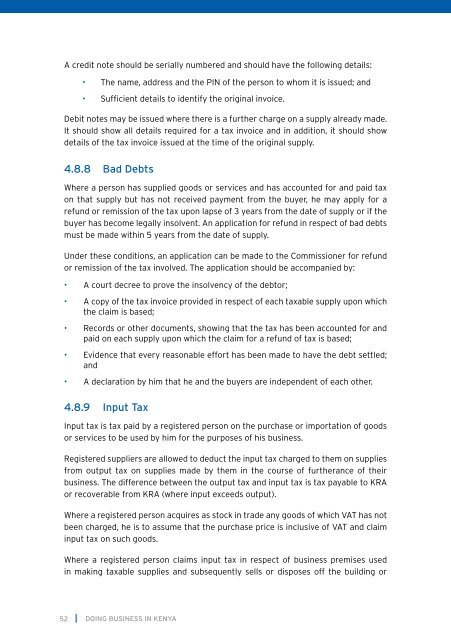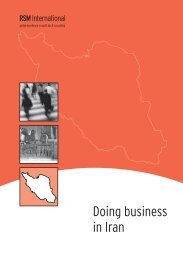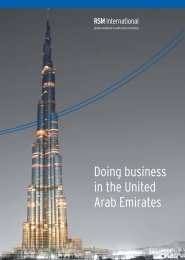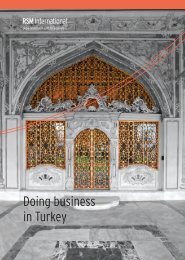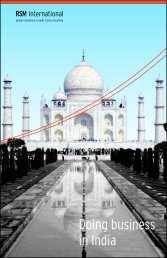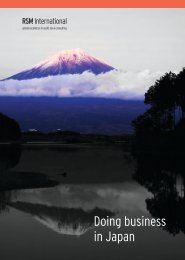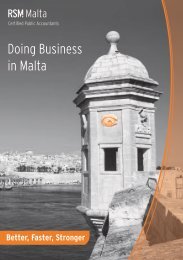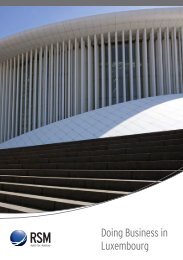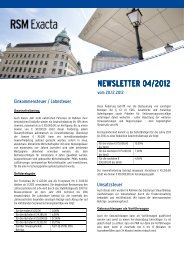Doing Business in Kenya - RSM International
Doing Business in Kenya - RSM International
Doing Business in Kenya - RSM International
- No tags were found...
You also want an ePaper? Increase the reach of your titles
YUMPU automatically turns print PDFs into web optimized ePapers that Google loves.
A credit note should be serially numbered and should have the follow<strong>in</strong>g details:• The name, address and the PIN of the person to whom it is issued; and• Sufficient details to identify the orig<strong>in</strong>al <strong>in</strong>voice.Debit notes may be issued where there is a further charge on a supply already made.It should show all details required for a tax <strong>in</strong>voice and <strong>in</strong> addition, it should showdetails of the tax <strong>in</strong>voice issued at the time of the orig<strong>in</strong>al supply.4.8.8 Bad DebtsWhere a person has supplied goods or services and has accounted for and paid taxon that supply but has not received payment from the buyer, he may apply for arefund or remission of the tax upon lapse of 3 years from the date of supply or if thebuyer has become legally <strong>in</strong>solvent. An application for refund <strong>in</strong> respect of bad debtsmust be made with<strong>in</strong> 5 years from the date of supply.Under these conditions, an application can be made to the Commissioner for refundor remission of the tax <strong>in</strong>volved. The application should be accompanied by:• A court decree to prove the <strong>in</strong>solvency of the debtor;• A copy of the tax <strong>in</strong>voice provided <strong>in</strong> respect of each taxable supply upon whichthe claim is based;• Records or other documents, show<strong>in</strong>g that the tax has been accounted for andpaid on each supply upon which the claim for a refund of tax is based;• Evidence that every reasonable effort has been made to have the debt settled;and• A declaration by him that he and the buyers are <strong>in</strong>dependent of each other.4.8.9 Input TaxInput tax is tax paid by a registered person on the purchase or importation of goodsor services to be used by him for the purposes of his bus<strong>in</strong>ess.Registered suppliers are allowed to deduct the <strong>in</strong>put tax charged to them on suppliesfrom output tax on supplies made by them <strong>in</strong> the course of furtherance of theirbus<strong>in</strong>ess. The difference between the output tax and <strong>in</strong>put tax is tax payable to KRAor recoverable from KRA (where <strong>in</strong>put exceeds output).Where a registered person acquires as stock <strong>in</strong> trade any goods of which VAT has notbeen charged, he is to assume that the purchase price is <strong>in</strong>clusive of VAT and claim<strong>in</strong>put tax on such goods.Where a registered person claims <strong>in</strong>put tax <strong>in</strong> respect of bus<strong>in</strong>ess premises used<strong>in</strong> mak<strong>in</strong>g taxable supplies and subsequently sells or disposes off the build<strong>in</strong>g or52DOING BUSINESS IN KENYA


